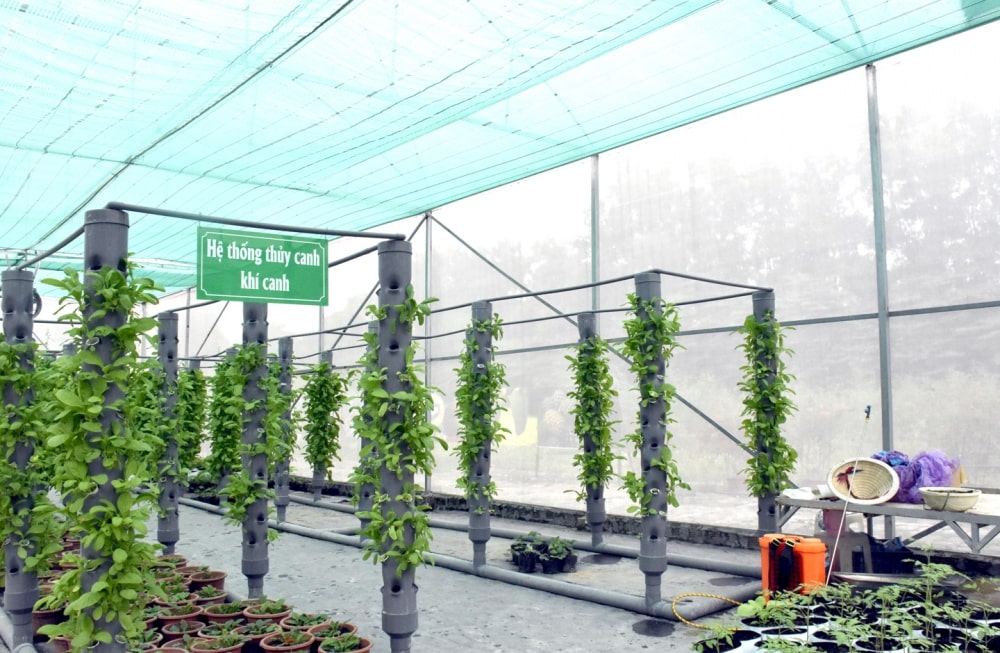It can be seen that Vietnam has been promoting digital transformation in many fields, in which agriculture is a top priority. But facing the increasing requirements of the export market, Vietnam's agricultural sector must improve its competitiveness and adapt to new conditions by applying smart technology in production activities
At the 2023 Annual Business Forum, Mr. David John Whitehead, Chairman of Mavin Group, representative of the Agricultural Working Group, said that the Covid-19 pandemic has created many changes in the market structure of the agricultural industry, such as the fact that many Vietnamese fruits and rice products have successfully penetrated the European market, where Thailand once dominated.

Photo by Bao Thoa
In 2023, Vietnam will continue to diversify markets, orient products to meet the requirements of export markets on food safety, effectively improve post-harvest activities including packaging. "We expect more opportunities for export growth of agricultural products in 2023," said David John Whitehead.
Along with that, the representative of the Agricultural Working Group also said that high inflation in export markets including the US and Europe has reduced seafood demand since the 4h quarter of 2022, this trend may last until the 1h quarter of 2023. However, it is expected that in the second half of 2023, the world economy will recover, the demand for seafood is increasing.
Free Trade Agreements (FTAs), especially the Comprehensive and Progressive Agreement for Trans-Pacific Partnership (CPTPP), have brought significant benefits to the domestic seafood industry, exports to CPTPP member countries in 2022 have increased by 30%, accounting for 27% of the total seafood export value of the country. In 2022, Vietnam's rice exports reached a record 7 million tons and rice purchase contracts will be maintained until early 2023 due to high prices. Thanks to strengthening quality control measures, Vietnamese agricultural products have reached many fastidious markets. Farmers and businesses have also considered developing value-added products.
It is expected that in 2023 and the following years, the requirements of the market will become more stringent, forcing the whole industry to innovate, improve adaptability and accurately identify opportunities to build a sustainable agricultural sector with an emphasis on environmental responsibility, and focus on circular agriculture as part of the circular economy.
Mr. David John Whitehead also forecasts that 2023 will focus on the rural economy with many new jobs created, promoting the operation of cooperatives, developing OCOP and promoting agritourism. All will create many opportunities for foreign businesses to unleash innovation when participating in the agricultural industry in Vietnam.
The agriculture sector needs to come up with new ideas, smart concepts, innovative farming models, digitalization, more efficient logistics and a greater focus on circular and environmentally responsible agriculture.
"New applications in agriculture are often based on traditional farming knowledge or experience. Follow the traditional values doesn't mean we're going to take circular agriculture backward; Instead, advanced farming techniques, robotization and precision farming using satellite data and drones will also play a big role in the farms of the future. One of Vietnam's development orientations for the period of 2021-2030 is to develop agriculture based on digital transformation and connect domestic and international markets.
Therefore, Vietnam's agriculture needs to apply advanced technologies and digital transformation to create a turning point in agricultural production and business, shifting from a traditional agricultural economy to an agricultural economy based on science and technology and digital transformation, including agricultural circular mechanisms," emphasized the representative of the Agricultural Working Group.
According to the Chairman of Mavin Group, recognizing the importance and contribution of local farmers and circular agriculture, the transition to large-scale farming activities from smallholders needs to be promoted more actively – improving quality management, minimize pollution, save energy, contribute to improving traceability and product quality, and control diseases more effectively. There is also a need for an accelerating momentum in digital transformation combined with Smart Agriculture, enabling better water, feed, fertilizer, traceability and waste management.
In addition, it is necessary to improve supply chain management and logistics to not only promote Vietnam's agriculture to participate in the global supply chain but also facilitate the transportation of goods and materials domestically at reasonable prices and more efficiently between provinces and cities and focal points and distribution centers. All this means that Vietnam's agricultural, forestry and fishery products from domestic and foreign companies will have a more competitive advantage in the international market and can meet other stringent quality and phytosanitary standards, including traceability and packaging.
View original article at: Tăng tốc nông nghiệp số (laodongthudo.vn)